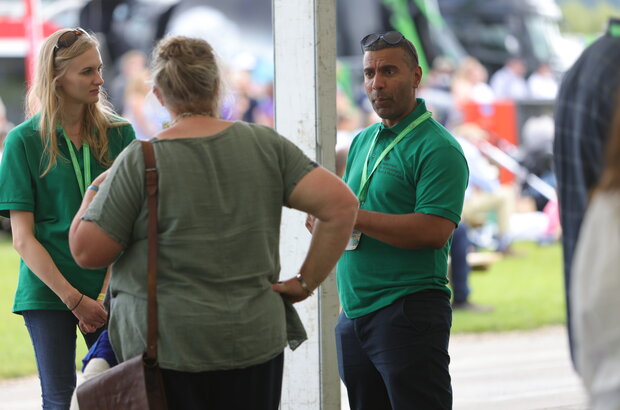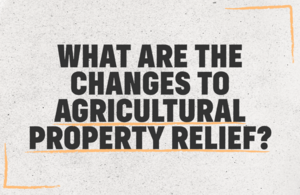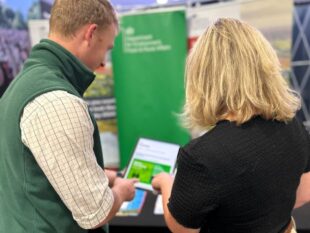
We recently published a blog post about the things we learned at this summer’s agricultural shows which took place up and down the country.
At most of those shows, we ran co-design taster sessions for members of the farming community, so they could get a sense, first-hand, of how they could shape our policies.
In this post, we're going to talk about some other things we learned that directly relate to co-design.
Learning as we go, in the open
Attending these shows was really valuable for us. It gave us a terrific opportunity to talk to the community directly about what we are doing, how they can be part of it, and learn about the issues that matter to them most.
More than 50 new people signed up for our co-design panel, a pool of people who are willing to help out with future research and co-design. You can still join the panel, simply sign up here.
Since the shows, we’ve been reviewing all the information that we received and the comments we heard, and grouped them into 6 themes:
1. Peer-to-peer and local learning
The most useful advice is the sort that understands and is relevant to a farm's type and local area. Many people we spoke to were keen to work in partnership with local neighbours on schemes and projects that would benefit all. They're also keen to share what they learn with others.
2. Making feedback visible
To help them make better, evidence-based decisions, farmers want to hear more details about the design and outcomes of the various tests and trials that are underway. This will help them decide whether or not to opt in to a particular service or scheme.
3. Communication is key
Most people we spoke to rely on trade media for their news and updates; but that said, a lot of them asked if we could be more active on social media. Some felt that information on GOV.UK isn't always as helpful as it could be, and not all farmers use the internet often, which forces them to consult third-party advisers to find out the latest.
4. Advisers play an important role
Farmers often contact advisers to get a clearer understanding of new schemes, and which ones are right for them. They also look for advice on new ideas in the industry, market changes, and tips for spotting signs of trouble on their farm.
5. Building trusting relationships
Defra-accredited advisers tend to earn more trust; they are seen as well qualified and impartial. Farmers prefer to seek advice from expert advisers where they can.
6. Financial concerns are real
It's not always easy to make a profit, and some farmers have depended on Basic Payments for years as a way to make ends meet. The new schemes being developed and launched provide critical support to many people and farming businesses, and its important to time them to start as BPS reductions begin.
Addressing concerns
Going to the summer shows was a positive experience for all of us, but not every conversation was all positive, all of the time. We also learned about some of the things that members of the community are most worried about.
People said relevant pages on GOV.UK could be clearer and easier to find.
People are confused about the various different schemes, who is eligible for what, and so on. We’re already working on providing information that’s clearer and easier to find. Some early steps include:
We know there is more to do and we'll be posting more about our GOV.UK content work soon.
And some people don’t believe that Defra wants to make policy and design schemes that work for the farming community.
We genuinely do, and co-design sessions are an important technique we use to make it happen. As I mentioned earlier, you can be part of it. Sign up to join our co-design panel.
Your voice is important, and your views matter. Co-design means nothing without input from members of the farming community. It’s at the heart of our approach.




 The
The 
2 comments
Comment by Matthew Quirk posted on
So far am not impressed by the questionnaires I have had to fill in. All are focussed on trying to justify DEFRA's definitions of outcomes and one question asked me whether I thought ‘my relationship with DEFRA would develop positively in future’. Can someone tell me what that means? It sounds very like those post-customer service feedback questionnaires that are sent out asking how did they do. Where is the relevance? I’m not prepared to stroke the egos of DEFRA operatives until after the work has been done – and then only if they’ve done a good job. I need practical answers. Out of practical on-the-ground-work, which will usually cover a wide range of DEFRA categories, will come results that can be used to fill in post-work multiple choice boxes that will then show whether or not DEFRA has delivered. I realise that DEFRA is working on pilots. Good, but don't at the same time send out fatuous questionnaires. Organise your schemes so that advisors can get on with practical work, rather than be confused by which of them will be eligible for DEFRA fees. I have been in touch with one set of advisors who are completely practically minded, and who are raring to start, but cannot do so because DEFRA is delaying action by feeding more and more advisors into the mix and forcing organisations to assess their abilities. Stop doing this and let us get on. The more practical work you have going on outside the pilots and the sooner you have it started, the more and earlier you will get those results fed back and the bigger your database for assessing progress and making adjustments. Pilots work partly, not wholly. Stop blocking action, and allow us make a start now, please.
Comment by Sarah Stewart posted on
Hi Matthew,
Thank you for taking the time to visit the blog and for your feedback.
The Farmer Opinion survey is one way for farmers to tell us how they think our team is doing at designing, delivering and communicating our new policies for farming.
Because the survey tracks opinions over time, the findings help us to refine, reconsider or confirm our plans throughout delivery. It helps us to avoid making mistakes at the point of no return.
A positive, pragmatic relationship between our team and farmers is essential as we work towards common goals for the environment and farming. That's not to say we don't want to be challenged! But we know from the past that more gets done on the ground if we work together.
The survey, alongside our co-design and other engagement activities develop and enable that collaborative relationship.
We've studied what hasn't worked well in the past and we know how important it is to not launch our schemes in one fell swoop. We want to roll them out in a gradual and considered way starting with pilots, to ensure that they work in practice and achieve what we want them to do. Piloting is the means though which we will test, at scale, the future schemes in real-world situations, with a wide range of farmers and land managers.
The aim is to learn and innovate as we go. We are designing our schemes with farmers and stakeholders and addressing lessons learned from the past. If you or anyone you know is interested in sharing ideas about scheme development, please email the Co-Design Team at ffcpcodesign@defra.gov.uk, alternatively, I know my colleagues who manage the questionnaires would be be very happy to have a chat with you. I have already sent them your comment but let me know if you'd like to be put in touch.
Best wishes,
Sarah